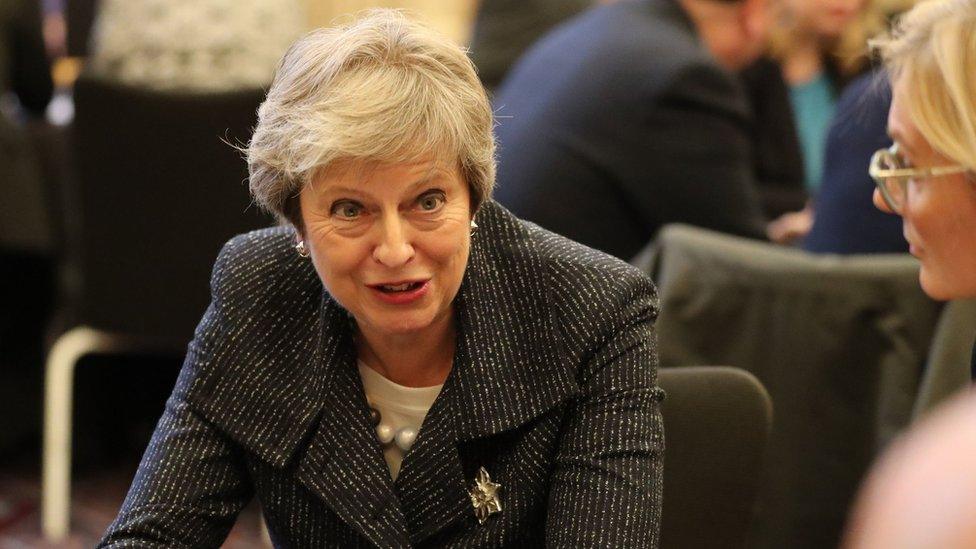Brexit: Theresa May denies 'rolling over' on deal
- Published
- comments

Theresa May has denied claims from DUP leader Arlene Foster that she had "given up" on negotiations before agreeing the Brexit deal.
Mrs Foster said the PM's trip to promote the deal to businesses in Wales and Northern Ireland was a "waste of time" as Parliament would not back it.
Meanwhile, former defence secretary Sir Michael Fallon told the BBC the deal was "doomed" and must be renegotiated.
Mrs May insists it protects the "vital interests" of the whole of the UK.
After enduring criticism of the Brexit withdrawal agreement in the Commons on Monday, the prime minister began the next day rejecting US President Donald Trump's suggestions that the deal could threaten future US-UK trade deals.
And as she travelled to Wales and Northern Ireland, promising that her Brexit plans would strengthen "every corner" of the UK, she came under fire from Mrs Foster, whose party has a parliamentary pact to support the Conservative government in key votes.
Foster: This is not the right deal for Northern Ireland
"The disappointing thing for me is that the prime minister has given up and she is saying... we just have to accept it," Mrs Foster told the BBC's political editor, Laura Kuenssberg.
"She may have given up on further negotiations and trying to find a better deal but I have not."
Sir Michael Fallon's decision to come out against the deal is another blow to the prime minister, who is struggling to muster support in Parliament ahead of a Commons vote on 11 December.
Labour, the Lib Dems, SNP and Democratic Unionists have all said they will reject the terms of the UK's withdrawal, and future relations negotiated by Mrs May.
Many Tories have also said publicly they are opposed to Mrs May's Brexit deal with the EU. Brexiteers fear it will keep the UK too closely tied to EU rules, making it harder to strike future trade deals with other countries.
If MPs voted against the deal, the government would have up to 21 days to tell the Commons "how it proposes to proceed" and a further seven to move a motion allowing MPs to express their views.
New laws would have to be passed if the UK wanted to avoid the default position of leaving without a deal on 29 March next year.
Former Defence Secretary Michael Fallon says negotiators should be sent back to Brussels
Sir Michael, who was previously regarded as a loyalist, now argues that Mrs May's deal "would see the UK give up its power to influence EU rules and regulations in return for vague assurances over future trade".
He told BBC Radio 4's Today programme it was the "worst of all worlds" and that Mr Trump's criticism of its repercussions for transatlantic relations "could not simply be brushed off".
However, the prime minister is continuing to make the case for the agreement, which she says delivers on the 2016 referendum vote in key areas and is in the national interest.

Mrs May has said Welsh farmers will enjoy a brighter future outside the Common Agricultural Policy
During a visit to an agricultural show in Builth Wells in Powys, Mrs May said: "We have already been talking to [the US] about the sort of agreement that we could have in the future... that is working very well."
When it was put to her that Mrs Foster had implied she "rolled over", Mrs May replied: "No, we have been resisting many of the things that the European Union wanted to put in this deal. When you negotiate neither side gets 100% of what they want."
Speaking later, in Northern Ireland, Mrs May said she had been given a "clear message" by businesses that the deal was in the national interest as it provided certainty.
"The overwhelming message I get is this is a deal that does deliver for constituents," she added.
Allow X content?
This article contains content provided by X. We ask for your permission before anything is loaded, as they may be using cookies and other technologies. You may want to read X’s cookie policy, external and privacy policy, external before accepting. To view this content choose ‘accept and continue’.
Under the proposed agreement, the UK would not be able to bring into force any trade deal with a country outside the EU until the end of the proposed transition period - currently scheduled to last until 31 December 2020.
In reality, any bilateral agreement between the UK and the US is likely to take years to negotiate given its complexity, differing standards in areas such as agriculture, and the fact it would require ratification by the US Congress.
In other developments:
Other political parties have demanded to be involved in any televised Brexit debate, after Theresa May challenged Jeremy Corbyn to a head-to-head encounter
Research published by the London School of Economics, King's College and the Institute for Fiscal Studies suggests the PM's Brexit deal could leave the economy as much as 5.5% smaller in 10 years time than it would be if the UK stayed in the EU
Judges at the European Court of Justice have concluded a four-hour hearing on whether the UK can call off the process of leaving the EU without permission from member states, with a verdict due at a later date
Labour has called for the government's full legal advice on the Brexit deal to be published this week. Home Secretary Sajid Javid said that decision was for the prime minister
The Brexit deal will make Scotland poorer, Scottish First Minister Nicola Sturgeon says
Companies looking to stockpile surplus supplies of fresh food in the run-up to Brexit in March may be too late, an industry official tells MPs
NHS Brexit contingency plans could be enacted before Christmas, Parliament has heard. Health Secretary Matt Hancock told an MPs' committee that invitations to tender had been issued for refrigeration and storage worth "in the low tens of millions"
Could Brexit be delayed?
Sir Michael said the 29 March 2019 date for Brexit, which is enshrined in UK law, may have to be pushed back to give negotiators the time to make major improvements to the agreement.
All 28 EU states would need to agree to extend the Article 50 process of negotiations to allow this to happen, something Theresa May has repeatedly ruled out.
Cabinet Office David Lidington said he did not think doing this "would get us anywhere" as the EU had made clear this was the only deal on the table.
He told Today there was no "Plan B" and the agreement was a "decent compromise" which would provide a springboard to the next stage of negotiations on the two sides' future relationship.